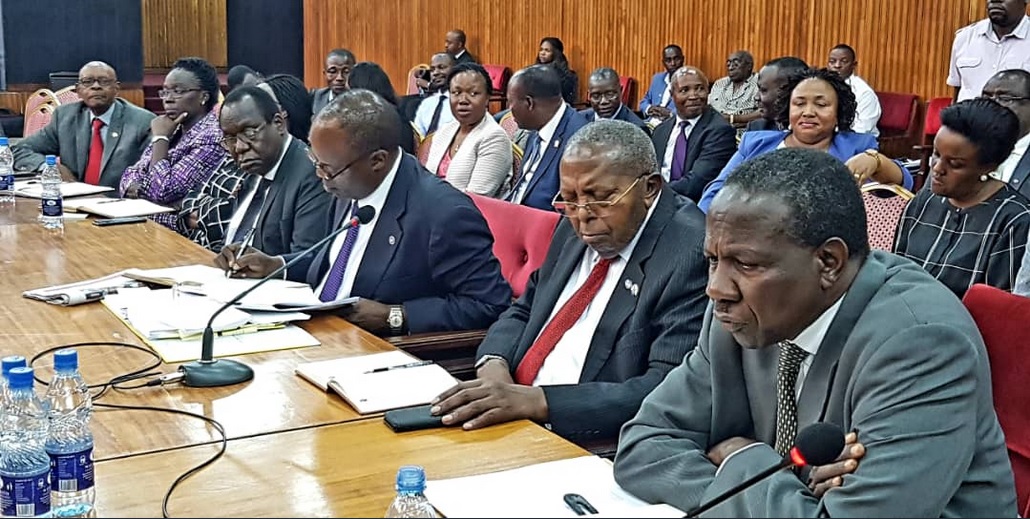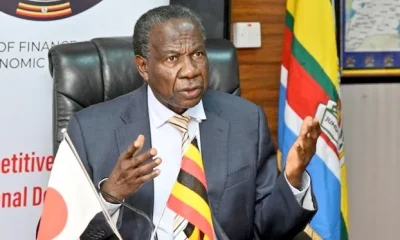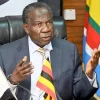Business
Mutebile’s legacy in total jeopardy with COSASE probe

Minister Kasaija (extreme right) sitting next to BoU Governor Mutebile and Deputy Louis Kasekende, while appearing with other Board Members of BoU before the Parliament’s COSASE probe
Economic historians will have a field day when they get down to scripting events that unfolded during the 18-year reign of Bank of Uganda Governor Emmanuel Tumusiime Mutebile.
The ongoing Parliamentary probe into the failure and sale of all the seven defunct commercial banks has severely damaged the reputation of Governor Mutebile, once recognised as the most effective central bank governors on the African continent.
The unfolding revelations in the Committee of Commissions, Statutory Authorities and State Enterprises (COSASE) have depicted Mutebile as a man who has for a long time been out of touch with realities of the institution he pretended to wield a firm grip over. Rather he delegated nearly all the powers to a trusted junior and Executive Director of Supervision Justine Bagyenda, who apparently abused her power to coarse directors and managers of supervised institutions to fall for her selfish whims.
Historians will perhaps blame the deterioration in effective oversight and management of Mutebile to his appointing authority who used him to access the national treasury for personal interests in exchange for unbridled interference.
In BOU, the back stops at Museveni
The testimonies of some of the former directors of the defunct commercial banks this week were a huge indictment to Mutebile mostly because of the supreme authority he wields over the affairs of the bank, but also to President Yoweri Museveni and the Ministry of Finance, who are mandated to keep an eye on the governor.
Mutebile eluded external oversight by building a wall of invincibility around himself and the bank in his persistent call for independence from all oversight bodies, except occasionally from Parliament.
In reality, it was clear that he wasn’t beyond reproach especially from the President as the Chief Executive of Uganda, not only because he’s the appointing authority, but mostly because the actions of the Central Bank greatly determine the overall functioning of the economy and consequently the ultimate realization of the government’s manifesto.
In fact some people have pointed out that it’s Museveni who slept on his job because the signs were ominous; that Mutebile wasn’t in control, as seen from the hundreds of billions of depositors money and shareholders’ savings that was lost in the closures, not to mention the thousands of jobs and the invaluable reputation of the financial sector.
See also
Mutebile was misled?! Really?
Mutebile for Guinness book of world records
Dr. Sudhir Ruparelia, Uganda’s richest man and Vice Chairman of the defunct Crane Bank, revealed that Justine Bagyenda forced them to buy the assets of National Bank of Commerce, that belonged to a group of prominent politicians and business people from Kigezi region including Ex-Prime Minister Amama Mbabazi.
“Crane Bank was not interested in acquiring the assets of NBC. Crane Bank did not bid to acquire these assets. Crane Bank was compelled to acquire these assets by Ms Bagyenda. She did this on telephone. She called the Crane Bank MD and informed us that she was directing Crane Bank to acquire these assets. She was not asking. It was an order from the authorities,” Ruparelia the COSASE probe.
Similar testimonies pointed to the direction of unbelievable abuse of power by Bagyenda under Mutebile’s watch.
At some point during the probe, Busiro East MP Medard Sseggona was prompted to ask Crane bank officials why they had to bend to Bagyenda’s orders as if she were a demigod!!
But Crane Bank’s Lawyer Alex Rezida, indicated that Bagyenda was answerable to no one. Rezida said that he received a telephone call from the former Executive Director, Supervision in BoU, Justine Bagyenda with instructions to take over NBC.
“Crane Bank was given only three days to integrate the NBC deposits into their system,” said Rezida.
The sense of culpability has expanded to the Minister of Finance who, while appearing in the same COSASE committee on Friday, admitted that despite the haemorrhage in the financial sector, they never obtained a single report on the closure of any of the banks, nor did they ask for one.
Finance Minister Matia Kasaija admitted he has never demanded for a report on the closure of any of the banks. @ I admit I have never seen reports even on Crane Bank.”
He said: “We have never had a deep study to investigate what is not going well in the financial sector.”
Restore corporate governance at the top
There is no doubt that the COSASE probe will have far-reaching implications on the central bank, with the likely possibility of an overhaul of the top leadership of the bank as well as the legal regime governing its operations.
Imagine for example, that the Board of Directors, which in corporate governance principles, is supposed to check the management, is instead chaired by the governor himself and deputized by the deputy governor.
The Board of Directors of the Bank of Uganda:
Prof. Emmanuel Tumusiime Mutebile – Governor and Chairman (currently serving since January 12, 2011)
Dr. Louis Kasekende – Deputy Governor and Deputy Chairman
Mrs. Susan Wasagali Kanyemibwa- Board Secretary
Dr. William Kalema- Board Member
Mr. James Kahooza- Board Member
Mrs. Judy Obitre-Gama- Board Member
Mr. Keith Muhakanizi- Board Member
Ms. Josephine Okui Ossiya – Board Member
Whereas BoU has prided in independence, the probe has clearly demonstrated that without the supervision of anyone, things can go terribly wrong.
Already there are calls including from COSASE Deputy Chairperson Anita Among for the creation of an independent body to supervise the central bank.
Minister Kasaija couldn’t hide his guilt on failure to supervise BoU when he proposed that the Depositors Protection Fund will in the future play the supervisory function over the central bank.
For Mutebile, it seems that Mutebile’s reputation has been obliterated and his departure is a matter of time.
Comments


























